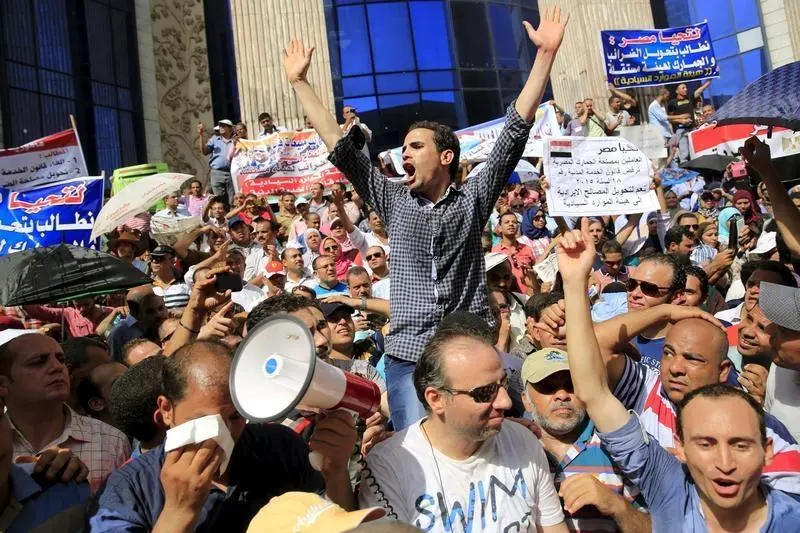PHOTO
Hundreds of government employees have been protesting this week against the application of a new civil service law, reports Mona El-Fiqi
Cairo witnessed its biggest protests in months this week, when employees from the tax and customs authorities gathered in front of the Press Syndicate in downtown Cairo to protest against the application of the new civil service law.
This law, number 18 of 2015, came into effect in July 2015. Its application is expected to be set out within the coming few days, with five million government employees subject to it.
Employees at the tax and customs authorities have complained that they will be harmed by the law, which deprives them of the special bonuses they receive according to the authorities' revenues.
The civil service law was prepared by the government and approved by President Abdel-Fattah Al-Sisi in March 2015. It replaces law number 47 of 1978 and aims to reform Egypt's administrative apparatus, tackling issues of hiring and wages in government institutions.
Some articles of the law have been controversial since the government has said they will curb bureaucratic inefficiency but employees believe they will reduce their incomes and make it easier for the government to fire them.
Last month, the Syndicate for Tax Authority Employees submitted a memo to the cabinet requesting that they be excluded from the law but without receiving a response.
The employees feel that the government has disregarded their opinion, and they have escalated the situation by gathering to express their refusal of the law and demand its annulment.
In response, the cabinet held a meeting on Monday to discuss the new law, later issuing a statement that said the law would be applied to all authorities subject to civil service law 47 of 1978.
"The government is convinced that issuing the law will lead to administrative reforms and be a step in the direction of wider social, economic and political reforms," Prime Minister Ibrahim Mehleb said, according to a statement by the cabinet.
The cabinet statement explained that doctors, teachers and employees at the Transportation Authority were excluded from the law because they were not subject to the earlier one.
Ashraf Al-Arabi, the minister of planning, said the government was not considering changes to the law and that the presidency and cabinet were the only authorities that would be excluded, being "special cases".
He said that law 47 stipulates that if an employee receives a weak assessment for two years running he can be fired, but the new law gives him opportunities to develop.
Under the new law, an employee with a weak assessment for two years can be transferred to another job at the same level. If the assessment is still weak after three years, a percentage can be deducted from his salary, according to the statement.
"If the weak performance continues, a human resources committee can decide on his fate," the statement said.
Law 47 permits promotion every six to eight years, but the new law allows an employee to be promoted every three years. Basic salaries under the new law will constitute 80 per cent of overall wages in all government institutions, as opposed to the older unit-by-unit system, while bonuses, traditionally dependent on seniority, will be calculated on performance.
The law accelerates promotion and makes it dependent on an employee's performance as opposed to his or her seniority. According to Minister of finance Hani Kadri, the salaries of government employees rose by 15 per cent last year, to reach a total of LE218 billion.
© Al Ahram Weekly 2015





















